Hadith No. 12 - The Beauty of Islam: Mind Your Own Business
عَنْ أَبِي هُرَيرَةَ رضي الله عنه؛ عَنِ النَّبِيِّ صلى الله عليه وسلم؛ قَالَ: «مِنْ حُسْنِ إِسْلَامِ المَرْءِ تَرْكُهُ مَا لَا يَعْنِيهِ». حَدِيثٌ حَسَنٌ، رَوَاهُ التِّرْمِذِيُّ وَابْنُ مَاجَه
Translation
The Prophet ﷺ said:
“Part of the perfection of a person’s Islam is to leave what does not concern him.”
We have already discussed Abū Hurayrah رضي الله عنه, the narrator of this hadith, in the previous section. This narration has come through different chains and was recorded by al-Tirmidhī (2318) and Ibn Mājah (3976), among others. Though some differed on its exact chain, the scholars generally agreed on its authenticity, and its meaning is widely accepted, which is why Imām al-Nawawī included it in his collection and graded is as ‘Hasan’.
Introduction
This hadith is a jewel of Prophetic wisdom. It refines Islam from mere outward practice to an elegant lifestyle of focus, dignity, and restraint. It teaches us that what we choose not to do is as important as what we do. In our noisy, intrusive world filled with gossip, idle talk, wasted time, and opinions without knowledge, this guidance becomes a shield and a compass.
Imām Ibn Rajab رحمه الله described it as one of the foundations of Islamic etiquette[1]. Imām Ḥamzah al-Kinānī رحمه الله went so far as to say, “This hadith is one-third of Islam.”[2] Imām Ibn ʿAbd al-Barr رحمه الله observed: “The words of the Prophet ﷺ here are of the most comprehensive kind, containing vast and noble meanings in the fewest words — something that none before him ever said.”[3]
Ibn Ḥajar al-Haythamī رحمه الله remarked: “This hadith is a quarter of Islam as stated by Abū Dāwūd; but I say it is half of Islam, rather, it is the entirety of Islam.”[4] Imām al-Nawawī رحمه الله cited the statement of Abū Dāwūd that the essence of Islam revolves around four hadiths, and this is one of them[5]:
Some scholars said that “The sum of all good manners and their controlling principles branch out from four hadiths”[6]:
Explanation
The phrase Ḥusn al‑Islām (حُسْنُ الإِسْلَامِ) means the beauty, excellence, and refinement of one’s Islam. It comes from the same root the word Iḥsān comes from which we explained in detail in the hadith of Jibrīl. The phrase Mā lā yaʿnīhi (مَا لَا يَعْنِيهِ) means “That which does not concern him” means that does not benefit him in his religion or worldly life.”[7] Here the word Yaʿnīhi: “That which his care is attached to, part of his aim and purpose; ʿināyah means strong concern, to attend to and seek something.”[8]
Explaining this hadith, Imām Ibn Rajab al-Ḥanbalī رحمه الله says: “Whoever perfects his Islam leaves what does not concern him by the rule of Sharīʿah.” The meaning is that when a person’s Islam is good, he abandons every word and action that is irrelevant and confines himself to what truly matters. What concerns him is to which his care should be attached, that which serves his purpose and aim. The word ʿināyah in Arabic means strong attention and care; The word is used when he is occupied with and seeks after something. He further emphasises that the hadith does not mean leaving aside what one simply feels no interest in by whim or laziness, but leaving aside whatever Islam does not require or approve.
He continues that Islam obliges performing the duties, as taught in the hadith of Jibrīl, while, when one’s Islam becomes complete and perfect, it calls a believer to leave not only prohibitions but also doubtful matters, disliked things, and even excess of the permissible that he does not need. Such refinement belongs to the level of iḥsān, to worship Allah as though one sees Him, and though one does not see Him, to know with certainty that Allah sees him[9].
Ibn Ḥajar al-Haythamī رحمه الله adds that the things which truly “concern” a person are those necessities directly tied to his livelihood and faith, such as food that removes hunger, drink that quenches thirst, clothing that covers nakedness, and actions that protect chastity. Above all, it is what secures one’s safety in the Hereafter through Islam, īmān, and iḥsān. Beyond this, much of what people chase after, such as worldly pleasures, excessive possessions, positions of power, the craving for praise and fame, or idle talk and actions, are all mā lā yaʿnīhi, matters that do not truly concern the believer[10].
Restricting oneself to what truly matters safeguards a person from countless spiritual diseases, disputes, and wasted opportunities. It is a sign of deep īmān, true taqwā, and a heart detached from vain worldly desires. Instead of chasing what has no eternal benefit, the believer invests his time in what draws him closer to Allah ﷻ.
This single line of the Prophet ﷺ provides a compass for modern life, where distractions and intrusions abound. It calls us to live with dignity, focus, and modesty before Allah; choosing wisely what deserves our attention and leaving what wastes our life. Al-Ḥasan al-Baṣrī said: “From the signs of Allah turning away from a servant is that He makes his preoccupation in what does not concern him.”
Ibn Kathīr رحمه الله, commenting on the verse {وَالَّذِينَ هُمْ عَنِ اللَّغْوِ مُعْرِضُونَ} (al-Muʾminūn 23:3), said: “That is, from falsehood, and this includes shirk as some have said, sins as others have said, and everything of speech and action that carries no benefit.” He connected this with the Qur’ānic praise of those who, when they pass by idle talk, pass by with dignity (al-Furqān 25:72). Thus, the Qur’ān and Sunnah together urge the believer to turn away from all that is false, harmful, or simply without value, training the soul to give weight only to what benefits in this world and the next.
Guarding Tongue and Fingertips
The tongue and fingertips (the keyboard) are the main battlefield of this hadith. Ibn Rajab رحمه الله noted that the majority of what falls under mā lā yaʿnī relates to idle and excessive talk, which has been repeatedly condemned in the Qur’an and Sunnah. Most of the things we discuss in our WhatsApp groups and social media pages may fall under this category.
Allah ﷻ says:
لَا خَيْرَ فِي كَثِيرٍ مِنْ نَجْوَاهُمْ إِلَّا مَنْ أَمَرَ بِصَدَقَةٍ أَوْ مَعْرُوفٍ أَوْ إِصْلَاحٍ بَيْنَ النَّاسِ
“There is no good in much of their private conversation, except for those who enjoin charity, or what is right, or reconciliation between people.”
(Al-Nisāʾ 4:114)
The Prophet ﷺ warned Muʿādh ibn Jabal:
“Is there anything that topples people on their faces in the Hellfire except the harvests of their tongues?” (al-Tirmidhī).
In Musnad Aḥmad, the Prophet ﷺ said: “Part of the excellence of a man’s Islam is his reducing speech about what does not concern him.”[11] Similarly, al-ʿUqaylī narrates: “The most sinful of people are those who speak most about what does not concern them.”[12]
Imām al-Shāfiʿī رحمه الله explained the essence of this hadith by saying: “Its meaning is that when a person wishes to speak, let him first think: if it becomes clear that there is no harm upon him, let him speak; but if it appears that there is harm, or if he even doubts about it, let him remain silent.”[13] This highlights the discipline of reflection before speech or text that we make, whether physically or in our digital space, a principle sorely needed in times when words are poured out instantly without thought.
Idle talk, gossip, and speculation destroy relationships, waste time, and burden the scale of deeds. For the believer, silence is often worship. The Prophet ﷺ said: “Shall I not tell you of a deed that is light on the body but heavy in the scale? Silence, good character, and leaving what does not concern you.”[14] (Ibn Abī al-Dunyā, al-Ṣamt).
Intruding into Others’ Privacy
One of the clearest applications of this hadith is in respecting the privacy of others. Islam strictly forbids curiosity that crosses boundaries and makes a person busy with matters that are not his concern. In a hadith the Prophet ﷺ warned that Allah dislikes gossip (qīla wa qāla), excessive questioning, and wasting wealth.[15]
Imām al-Nawawī explained: “As for qīla wa qāla, it refers to delving into people’s news and recounting what does not concern one of their conditions and actions.” He also noted another possible meaning of excessive questioning: persistent questioning into people’s private lives and circumstances, which often causes hardship for the one being asked. If he answers, it may burden him; if he refuses, it may embarrass him; and if he avoids answering altogether, it may be seen as bad manners. Thus, unnecessary probing into the details of others’ lives is harmful for both parties[16].
Many people, often without ill intent, fall into the habit of questioning others about deeply personal matters, asking, “Why are you not married yet?”, “Why don’t you have children?”, or “When will you have another child?”. While such questions may seem casual to the one asking, they can cause real pain, embarrassment, or even humiliation to the one being questioned. The earlier quote of Imām al-Nawawī points out precisely this: probing into the details of other people’s private affairs. Often, the person being asked may not wish to disclose the truth, may be struggling with difficulties, or may find the question itself emotionally heavy. If he answers honestly, it could hurt him; if he avoids answering, it may be taken as bad manners; and if he fabricates or deflects, he risks falling into sin.
The Qur’ān sets the believer’s standard of conduct:
{وَلَا تَجَسَّسُوا} “Do not spy on one another.” (al-Ḥujurāt 49:12).
By guarding against intrusion into others’ affairs, whether through direct questioning, gossip, or digital voyeurism, a Muslim protects the honour of others and the purity of his own heart.
Prioritising and Time Management
Time is the most precious capital a believer possesses. This hadith also teaches us the importance of prioritising what truly matters and managing our time effectively. The Prophet ﷺ advised:
“Be keen on what benefits you.” (Ṣaḥīḥ Muslim).
Ibn Ḥibbān records a report from the Scriptures of Ibrāhīm عليه السلام, where the wise man is urged to divide his time into portions: one to converse with his Lord, one to reflect on himself, one to ponder Allah’s creation, and one for his personal needs. He is told never to strive except for three: preparing for the Hereafter, maintaining livelihood, or enjoying a lawful pleasure. Central to that wisdom is the line: “A wise man must be insightful about his time, devoted to his own affairs, guarding his tongue. Whoever counts his words as deeds will reduce his speech except in what concerns him.”[17]
The Qur’ān describes the believers:
“And those who turn away from idle talk.” (al-Muʾminūn 23:3).
Ibn Kathīr explains that laghw includes words, deeds, and preoccupations without benefit, precisely what this hadith instructs us to abandon. In our time, endless scrolling, binge-watching, and chasing trivial controversies consume lives. Even permissible things become destructive when they cross into excess. Ibn Rajab called these fuḍūl al-mubāḥāt—the superfluous permissible matters, which a mature Muslim should avoid.
Priority and focus are not identical for every person. Each believer has basic obligations that are shared, but beyond these, the details of what truly concerns one will differ according to one's role in life. An engineer’s focus will naturally differ from that of a doctor, just as a businessman’s concerns are not the same as those of an Islamic scholar. What benefits one’s profession, family, and community vary. Yet, what unites all is that indulging in matters that bring neither worldly nor eternal benefit remains a waste of life.
This hadith also warns against a growing trend in every age, people speaking, lecturing, and debating on subjects in which they have no expertise. The Qur’ān cautions us clearly:
{وَلَا تَقْفُ مَا لَيْسَ لَكَ بِهِ عِلْمٌ ۚ إِنَّ السَّمْعَ وَالْبَصَرَ وَالْفُؤَادَ كُلُّ أُولَٰئِكَ كَانَ عَنْهُ مَسْئُولًا}
“Do not pursue that of which you have no knowledge. Indeed, the hearing, the sight, and the heart, all of these will be called to account.” (al-Isrāʾ 17:36).
Thus, excellence in Islam means recognising what truly lies within one’s scope and responsibility, focusing one’s energy there, and refraining from delving into what is irrelevant or outside one’s knowledge. This protects a believer’s dignity, safeguards society from confusion, and cultivates a culture of humility and trustworthiness.
In other words, our lives should revolve around purpose, not distraction. True excellence in Islam is to fill one’s time with what matters: worship, family, learning, work, and service to others.
At the same time, we should understand that leaving what does not concern us does not mean withdrawing from society. Islam balances personal focus with collective responsibility. The Prophet ﷺ commanded us to enjoin good, forbid evil, reconcile between people, and support the oppressed. These do concern us, and neglecting them is blameworthy.
To conclude, this hadith reminds us that excellence in Islam means living with clarity of purpose, guarding our time, respecting the privacy of others, avoiding needless chatter, and focusing on what truly matters for both our dīn and our dunyā. In doing so, we polish our Islam with the light of iḥsān and the modesty of always standing before Allah.
The Prophet ﷺ demonstrated the danger of even small slips in this regard. In the case of Kaʿb ibn ʿUjrah رضي الله عنه, when his mother declared him destined for Paradise, the Prophet ﷺ corrected her, saying: “What makes you know, O mother of Kaʿb? Perhaps Kaʿb has spoken about what does not concern him, or withheld what would not harm him.”[18] This shows that idle speech or pointless withholding can endanger a person’s standing with Allah.
In another narration, the Prophet ﷺ said: “The first to enter upon you will be a man from the people of Paradise.” Then ʿAbd Allāh ibn Salām entered. When asked about the deed he most relied upon, he replied with humility: “My deeds are weak indeed, but the most hopeful is a sound heart and leaving what does not concern me.”[19]
Thus, the path to the elegance of Islam is not only through what we perform but equally through what we deliberately leave aside. In silence, restraint, and purposeful living lies the refinement of faith and the hope of Para
References:
[1] Jāmiʿ al-ʿUlūm wa’l-Ḥikam (1/308)
[2] al-Suyūṭī, Jalāl al-Dīn. Tanwīr al-Ḥawālik ʿalā Muwaṭṭaʾ Mālik, vol. 3, p. 96
[3] Ibn ʿAbd al-Barr, al-Tamhīd limā fī al-Muwaṭṭaʾ min al-Maʿānī wa-l-Asānīd, vol. 9, p. 199.
[4] Ibn Ḥajar al-Haythamī, al-Fatḥ al-Mubīn bi-Sharḥ al-Arbaʿīn, p. 301
[5] “The lawful is clear and the unlawful is clear…” (Ḥadīth of al-Nuʿmān ibn Bashīr).“From the beauty of a person’s Islam is leaving what does not concern him.”“A believer is not truly a believer until he loves for his brother what he loves for himself.” “Actions are judged only by intentions.” It is also reported that in place of the third, some cite: “Be indifferent to the world, Allah will love you; and be indifferent to what is in the hands of people, people will love you.”
[6] Imām Abū ʿAmr ibn al-Ṣalāḥ رحمه الله narrated from Abū Muḥammad ibn Abī Zayd, the leading Mālikī scholar of his time - “Whoever believes in Allah and the Last Day should speak good or remain silent.” “From the beauty of a person’s Islam is leaving what does not concern him.” “Do not become angry.” “A believer loves for his brother what he loves for himself.”
[7] Ibn al-Athīr, al-Nihāyah fī Gharīb al-Ḥadīth wa-l-Athar, vol. 3, p. 314.
[8] (Jāmiʿ al-ʿUlūm wa’l-Ḥikam 1/288
[9] Jāmiʿ al-ʿUlūm wa’l-Ḥikam 1/309-310
[10] Ibn Ḥajar al-Haythamī, al-Fatḥ al-Mubīn bi-Sharḥ al-Arbaʿīn, p. 300
[11] Aḥmad ibn Ḥanbal. Musnad al-Imām Aḥmad, Musnad al-Ḥusayn ibn ʿAlī ibn Abī Ṭālib, vol. 3, pp. 174, 177
[12] al-Suyūṭī, Jalāl al-Dīn al-Jāmiʿ al-Ṣaghīr, cited from Ibn Lāl and Ibn al-Najjār, from the narration of Abū Hurayrah.
[13] al-Nawawī, Yaḥyā ibn Sharaf Sharḥ Ṣaḥīḥ Muslim, vol. 2, p. 19.
[14] Ibn Abī al-Dunyā, al-Ṣamt wa Ādāb al-Lisān, p. 76
[15] Muslim, Ṣaḥīḥ Muslim, ḥadīth no. 593. Also narrated by al-Bukhārī (ḥadīth no. 1477)
[16] Sharḥ Ṣaḥīḥ Muslim 12/11
[17] Ibn Ḥibbān, Ṣaḥīḥ Ibn Ḥibbān, ḥadīth no. 361, from Abū Dharr رضي الله عنه.
[18] al-Haythamī, Nūr al-Dīnو Majmaʿ al-Zawāʾid, vol. 15, pp. 313–314, Ibn Abī al-Dunyā, al-Ṣamt wa Ādāb al-Lisān, ḥadīth no. 110.
[19] Ibn Abī al-Dunyā, al-Ṣamt wa Ādāb al-Lisān, ḥadīth no. 111.
More Related Articles:
Hadith No. 11 –The Path to Tranquility: Avoiding Doubtful Matters
Hadith No. 10: Ṭayyib – A Believer's Lifestyle and His Pathway to Accepted Worship
Hadith No. 9 – Fulfilling Commands, Avoiding Prohibitions, and Restraining from Excessive Inquiry
Disclaimer
The views expressed in this article are the author’s own and do not necessarily mirror Islamonweb’s editorial stance.

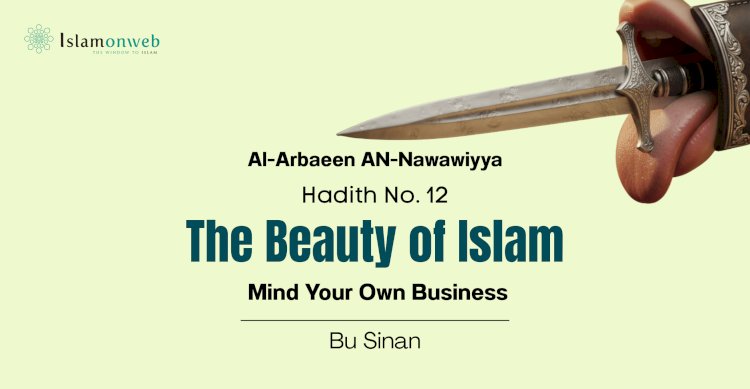



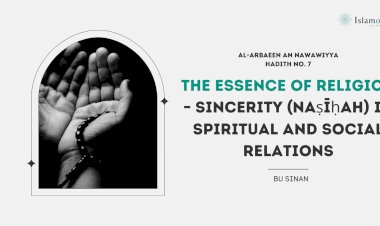
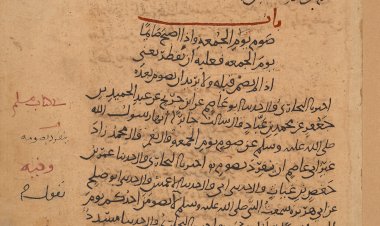
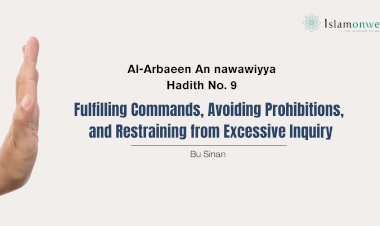
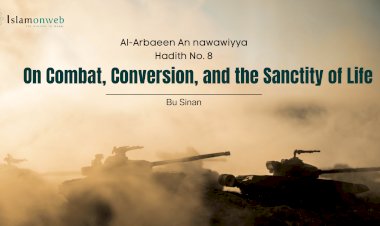















Leave A Comment